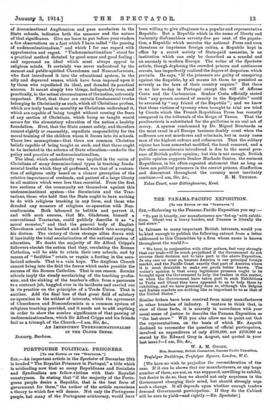PORTHGUESE POLITICAL PRISONERS.
[To WM EDITOR On TH1 "Sraor.oroa."] Sin,—An important article in the Spectator of December 20th is headed "The Royalist Prisoners in Portugal," a title which is misleading now that so many Republicans and Socialists and Syndicalist& are fellow-victims with their Royalist countrymen. In stating that "if the majority of the Portu- guese people desire a Republic, that is the best form of government for them," the author of the article enunciates a theory to which few will demur. Not only the Portuguese people, bait many of the Portuguese aristocracy, would have been willing to give allegiance to a popular and representative Republic. But a Republic which in the name of liberty and fraternity disfranchises seventy-five per cent, of the popula- tion, a Republic which muzzles the national Press and even threatens or imprisons foreign critics, a Republic kept in office by a secret society of State-paid assassins, is an institution which can only be described as a scandal and an anomaly in modern Europa The writer of the Spectator article, though deploring the crowded prisons and continuous arrests, has imperfectly realized the degree of despotism which prevails. He says, "If the prisoners are guilty of conspiring against the Republic, by all means let them be punished as severely as the laws of their country require." But there is no law to-day in Portugal except the will of Affonso Costa and the Carbonarioe. Senhor Costa officially stated that "any person accused of enmity to the Republic" could be arrested by "any friend of the Republic "; and we knew that these victims of tyranny when brought to trial are tried by Courts which the French Republican Press has recently compared to the tribunals of the Reign of Terror. That the penitenciaria is substituted for the guillotine is no real act of mercy. A system condemned by Dr. Miguel Bombards as the most cruel in all Europe becomes doubly cruel when the sufferers are not murderers and criminals, but in many cases men of the highest culture and refinement. That the solitary rigime has been somewhat modified, the hood removed, and a few other amendments introduced is due to the moral pres- sure of British public opinion; but this is not enough. British public opinion supports Senhor Machado Santos, the eminent Republican, in his often-repeated statement that as long as there are political prisoners in the convict prisons, disaffection and discontent throughout the country must inevitably
continue.—I am, Sir, lie., E. M. TENISON.
Yokes Court, near Sittingbourne, Kent.


















































 Previous page
Previous page